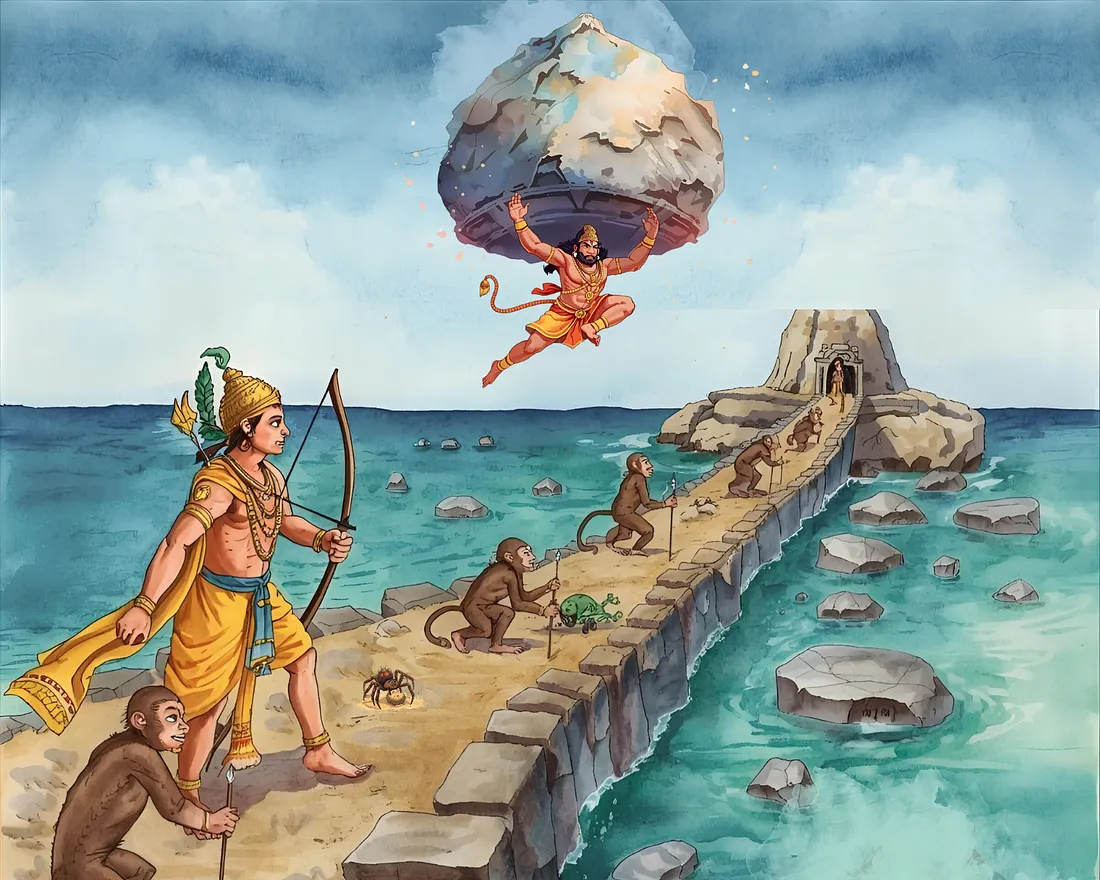 Once, on his guru maharaja’s disappearance day, Srila Prabhupada said, “On the absolute platform, there is no difference between the appearance and the disappearance of the spiritual master. Both are beautiful, just like the sunrise and the sunset.” So, although we feel separation, within that separation our remembrance of Srila Prabhupada is heightened, and thus we experience the beauty of his presence—in separation.
Once, on his guru maharaja’s disappearance day, Srila Prabhupada said, “On the absolute platform, there is no difference between the appearance and the disappearance of the spiritual master. Both are beautiful, just like the sunrise and the sunset.” So, although we feel separation, within that separation our remembrance of Srila Prabhupada is heightened, and thus we experience the beauty of his presence—in separation.
To straightaway speak about Srila Prabhupada’s departure feels abrupt to me, because it is a painful topic; but remembering Srila Prabhupada’s words that the disappearance is also beautiful, I wanted to share with you a lesson I learned from his departure.
A few days before he was to leave us, Srila Prabhupada expressed a desire to travel by bullock cart to different holy places in India. His Holiness Lokanath Swami had been traveling by bullock cart to different places of pilgrimage, and Srila Prabhupada was very enlivened when Lokanath Swami reported to him in Vrindavan. Prabhupada said that he too would like to go on pilgrimage on a bullock cart. He asked Lokanath Swami to arrange it, and Lokanath Swami was enthusiastic, having been encouraged by Prabhupada in such a direct way. He immediately went to organize the cart and make all the arrangements. Govardhana-puja was to take place in a couple of days, and Prabhupada said that he would begin his pilgrimage by traveling on a bullock cart to Govardhana Hill to celebrate Govardhana-puja with the Vraja-vasis.
At that time, Srila Prabhupada was bedridden and emaciated. He was unable to eat, and he was able only to sip a little liquid. So he was very gaunt and weak, with almost no energy. He would just lie on his bed, and sometimes, with great difficulty, he would speak softly, often so faintly that only those very close to him could hear his words.
There were many devotees in the room when Srila Prabhupada had his exchange with Lokanath Swami. And immediately after the discussion ended and devotees went outside, they began to express two strong, heartfelt opinions about what Srila Prabhupada should do—and, more than that, how we as disciples should relate to Srila Prabhupada and serve him.
One group, which included Lokanath Swami and other esteemed, senior disciples, such as Hamsaduta Prabhu and Baradraj Prabhu, felt that we should just do what the spiritual master orders. We shouldn’t question his order; we should just execute it. And some of the other disciples, many of whom had been attending to Prabhupada’s personal care, felt that Prabhupada’s health would not sustain his travels on a bullock cart and that, because he was so emaciated (he had practically no flesh on his bones), it would be very painful for him to go. Even if they padded the cart with a mattress, it would still be a basic bullock cart, and the roads in Vraja were very rough, so the movement of the cart would jostle Prabhupada and he would feel pain. Some devotees feared that he might even give up his body on the way. So, they did not want him to be subjected to what they foresaw as certain pain—and perhaps the dire consequence of death.
But this second position was very difficult to maintain under the circumstances, because Srila Prabhupada was so emphatic. “Let me travel to all the tirtha-sthanas,” he had said—to all the holy places. And whatever objections devotees had raised against the proposal, he had countered. “One-day experiment,” he had pleaded. “Rest assured. I will not die in one day.” When even Prabhupada’s kaviraja had predicted that with all the jostling on the bullock cart, Prabhupada would not survive more than two hours, Prabhupada had replied, “But I think I shall be cured.” Still, Tamal Krishna Goswami, Bhakti Charu Swami, Bhaktisvarupa Damodara Maharaja, Bhavananda Maharaja, and others felt strongly that this “experiment” would have dire consequences. But how to convince Prabhupada?
So, the controversy continued. When Prabhupada said, “I think I shall be cured,” Hamsaduta and others took it that he was supporting their position. But the other side took it differently: “What does it mean that he is going to be cured? It means that he is going to leave his body and get a spiritual body. That’s how he is going to get cured.” Each party was seeing things in a particular way that supported their particular point of view.
Finally, things came to the stage where the bullock cart was waiting outside the gates of the Krishna-Balaram Mandir. Everything was being readied. And for the devotees who were in the mood that Srila Prabhupada should stay, it must have been like when the residents of Vrindavan saw Akrura getting the chariot ready to take Krishna to Mathura.
The evening before the planned parikrama, Srila Prabhupada was lying on his bed (many of you have seen his bed in his house in Vrindavan). Bhakti Charu Swami was in the room, and Srila Prabhupada’s godbrother Akincana Krishna dasa Babaji Maharaja was there for a visit. Babaji Maharaja was a very advanced devotee; Srila Prabhupada had said that he was a paramahamsa. He was always engaged in hari-nama, absorbed in hari-nama, and he was always blissful. And he and Prabhupada had an extraordinarily affectionate relationship.
So, Bhakti Charu thought, “Let me appeal to Babaji Maharaja. If he asks Prabhupada not to go, then Prabhupada may listen.” And when he explained the situation to Babaji Maharaja, Maharaja declared, “Then he shouldn’t go.”
“So, do you all jointly request me not to go?” Srila Prabhupada asked when Maharaja had conveyed his conclusion. “Ji,” Maharaja confirmed.
“We were getting so upset,” Tamal Krishna agreed. “Two devotees told me this road is so bad that if you go on it, you’re going to be jolted back and forth. The road is terrible. I just can’t understand, Srila Prabhupada, why it has to be tomorrow that we have to go. If anybody wants you to travel, I do. But why do we have to go when you’re in this condition? I can’t understand it.”
“All right,” Srila Prabhupada said. “I will not go.”
“Thank you, Srila Prabhupada,” said Bhavananda. “I was in too much anxiety.”
“No, no, I cannot put you in anxiety. I shall do what you like.”
“Actually, Srila Prabhupada,” said Tamal Krishna, “we’re so attached to you that you practically drive us to madness sometimes. Tonight we were becoming mad.”
“No, I shall not do that,” Prabhupada said. And to Babaji Maharaja he added, “Just see how much they love me . . . Left hand, right hand. I cannot refuse.”
“The way you deal with us simply deepens our attachment every moment,” Tamal Krishna said.
And Prabhupada replied, “It is my duty.”
For the devotees in the room, it was a jubilant occasion that Prabhupada had agreed to wait. As Tamal Krishna Goswami had said, “We will take you on tirtha-yatra, to all the places. Just get a little stronger.” But when the news reached the other group, they were upset: “This is not our duty as disciples, to try to prevail upon our spiritual master. Our duty is to execute his will. He said that he wants to go by bullock cart to Govardhana, and our duty is to arrange for what he wants. Our duty is not to advise him or prevail upon him according to our perception.” The controversy continued until the end—the anniversary of which is today.
Prabhupada spent his last three days with his disciples at the Krishna-Balaram Mandir, and the last day he didn’t speak. His only words were in the morning, when the kaviraja asked him to drink some juice and he replied, “Meri kuch iccha nahin”: “I have no desire.” After that, Prabhupada didn’t speak. He was in a completely internal state of consciousness, and the devotees surrounded him with kirtan. For the last few hours, in the afternoon, the leaders opened up the doors to everyone. Young, old, children, men, women—all were allowed to be in the room with Srila Prabhupada and to reciprocate love with him. Then, at about 7:26 p.m., his tongue and mouth moved—“Hare Krishna”—and he left.
As for the controversy, it continued; even after Prabhupada left, the feelings still ran strong on both sides. And I still couldn’t determine who was right. There were devotees senior to me on both sides—devotees whom I respected and had served. Personally, I may have been closer to some of the ones engaged in Srila Prabhupada’s personal service, but still I wasn’t sure who was right, and it was on my mind.
It was my habit, or practice, to chant japa in Srila Prabhupada’s rooms (though not when he was there), and after he departed, I did that. I was in his room chanting japa, and behind his bed was an area with his bookshelves. So, I found a little corner there and was chanting japa, when somehow my eyes fell upon the new volume of Srimad-Bhagavatam that had just arrived—the Tenth Canto, Volume Two. It had been delivered into Srila Prabhupada’s hands in his last days. When the devotees had presented the book to Srila Prabhupada and he was looking at the pictures, everyone could see the love in his eyes. Tamal Krishna Goswami had remarked, “How much love for Krishna Prabhupada has,” as evident from the way Prabhupada had been looking at the pictures of Krishna. So, I saw the book. It had gold embossing, made especially for Srila Prabhupada. I opened it up, and it happened to open to Chapter Nine: “Mother Yasoda Binds Krsna.” I read a few verses and purports, and then I came to a verse that, to me, answered the question:
TEXT 19
evam sandarsita hy anga
harina bhrtya-vasyata
sva-vasenapi krsnena
yasyedam sesvaram vase
TRANSLATION
O Maharaja Pariksit, this entire universe, with its great, exalted demigods like Lord Siva, Lord Brahma, and Lord Indra, is under the control of the Supreme Personality of Godhead. Yet the Supreme Lord has one transcendental attribute: He comes under the control of His devotees. This was now exhibited by Krsna in this pastime.
COMMENT
The pastime is encapsulated in the previous verse:
TEXT 18
sva-matuh svinna-gatraya
visrasta-kabara-srajah
drstva parisramam krsnah
krpayasit sva-bandhane
TRANSLATION
Because of Mother Yasoda’s hard labor, her whole body became covered with perspiration, and the flowers and comb were falling from her hair. When child Krsna saw His mother thus fatigued, He became merciful to her and agreed to be bound.
COMMENT
When I read these verses, I thought, “This is what happened.” The spiritual master is the transparent medium through which Krishna manifests Himself. Of course, in vraja-bhakti the relationship with Krishna is different. In Vraja, Krishna exhibits nara-lila, humanlike pastimes, in which there is complete intimacy and freedom between the devotees and the Lord. In the relationship between the disciples and spiritual master, there is always an element of awe and reverence—and duty. Still, duty is meant to lead to love. And Srila Prabhupada did say to Babaji Maharaja, “Just see how much they love me.”
One month earlier, there had been another incident. Srila Prabhupada had stopped drinking. Previously, he had said that when his father had wanted to leave his body, he had stopped drinking, and that this was a bona fide way to give up one’s body when the time came. Prabhupada didn’t make any announcement or anything; he just stopped drinking.
Upendra dasa, a very sweet devotee who was Srila Prabhupada’s servant at the time, innocently said to him, “Prabhupada, you have to drink. If you don’t drink, you will become dehydrated. And Prabhupada said, “Oh, you want me to drink? Call the GBC.” That decision—whether Prabhupada should drink or not—was no small matter.
So, Abhirama informed the GBC, and the GBC and senior devotees came into the room. Prabhupada said, “If I want to survive, of course I’ll have to take something. But my survival means so many inconveniences. Therefore I have decided to die peacefully.”
“Everything is in the hands of Krishna,” said Tamal Krishna. And that had been the mood, coming from Srila Prabhupada: everything depended on Krishna. Many times Prabhupada had said that he would accept whatever Krishna desired. If Krishna allowed him to stay, he would stay. And if Krishna wanted him to go, he would go. Previously, a disciple had asked him, “You said that your guru maharaja left early because he was disgusted. Is that the case with you?”
“No,” Srila Prabhupada had replied. “No. If Krishna allows me to stay in your association, I will be most happy to stay in your association.”
Now, however, Srila Prabhupada opened his eyes and said, “Krishna wants me to do as I like. The choice is mine. He has given me full freedom.” This was a different mood—a completely different answer. And it gave—and gives—us a glimpse into the intimate reciprocation between Prabhupada and Krishna.
So, we all went out into the anteroom and discussed. Kirtanananda Swami’s point was most clear and lucid and intelligent. “If Krishna has given Prabhupada the choice and Prabhupada is giving us the choice,” he said, “then we should ask Prabhupada to stay.” Everyone agreed: “Yes, we should ask him to stay.” Then a devotee said, “But all the GBC men aren’t here.” And Brahmananda retorted, “Come on. What GBC is going to say that they don’t want Prabhupada to stay?” So, it was decided, unanimously. We would go back into Prabhupada’s room and tell him that we wanted him to stay; Kirtanananda Swami would be the spokesman.
When we went back into the room, Prabhupada was lying quietly on his bed. As soon as we finished offering obeisances, Kirtanananda broke down and started sobbing. He couldn’t speak. Brahmananda, sitting behind him, rubbed his back to soothe him. Then Kirtanananda managed, “Srila Prabhupada, if Krishna has given you the choice, then don’t go! We need you!” Srila Prabhupada asked, “Is this your joint opinion? Have you discussed?” “Yes, we have all met together. We want you to remain and lead the movement and finish the Srimad-Bhagavatam.”
Prabhupada was silent for what seemed like an eternity. Then he yawned and said, “All right.” Just like that. He agreed to stay in such a nonchalant way. All the devotees were jubilant. Within ourselves, we were rejoicing: “Prabhupada is going to stay! Prabhupada’s going to stay! He is not going to leave us. He is going to finish Srimad-Bhagavatam. He is going to lead the movement.”
And Prabhupada said, “This is real affection.”
So, when I read this verse from the Tenth Canto, I thought of these two incidents and put them together. In both cases, when the disciples had expressed themselves—“We want you to stay,” “We want you to get healthy”—Prabhupada had said, “This is real love,” “Just see how much they love me.” So, I think that all the disciples in this controversy were acting on the basis of their realization of their devotion for Srila Prabhupada, but I believe that what Prabhupada really was doing was drawing out our loving sentiments—beyond our just following the order. Following the order is a given; there is no question. We have to follow the order of the spiritual master. To disobey the order of the spiritual master is an offense against the holy name. It is a basic principle of spiritual life. So, we are not talking about disobeying the order of the spiritual master; we are talking about developing loving feelings for the spiritual master and expressing them to him. When Srila Prabhupada brought us to that stage in those two incidents, he commented, “This is real love,” “Just see how much they love me.”
Relating the verse from the Tenth Canto to what Srila Prabhupada did with us, there’s also a parallel between the damodara-lila and that principle of spontaneous love. Every night during the month of Damodara, we recite the Damodarastaka, including verse three:
itidrk sva-lilabhir ananda-kunde
sva-ghosam nimajjantam akhyapayantam
tadiyesita-jnesu bhaktair jitatvam
punah prematas tam satavrtti vande
“By such pastimes He is drowning the inhabitants of Gokula in pools of ecstasy and revealing to those devotees who are absorbed in knowledge of His supreme majesty and opulence that He is only conquered by devotees whose pure love is imbued with intimacy and is free from all conceptions of awe and reverence. To this Supreme Lord, Sri Damodara, whose belly is bound not with ropes but with His devotee’s pure love, I offer my humble obeisances.”
The damodara-lila shows pure, spontaneous love’s special power to conquer the Lord. The Lord comes under the control of such pure love. In the same way, Srila Prabhupada—not exactly that he came under the control of our love, but I would say that he brought that love out from deep within the recesses of our hearts, and then he reciprocated with us by coming under our control, by agreeing to our requests.
So, this is a very deep pastime of Srila Prabhupada’s. Among the disciples who were around him at the end, it was understood that he was the perfect acharya—he had taught us by his own example how to live in Krishna consciousness, and now he was teaching us how to die in Krishna consciousness. That was the general idea in those months and weeks, that he was showing us how to retire to a holy place and how to be absorbed in hearing the holy names of the Lord, and how up until the end, even in his delicate condition, he was trying to push forward the mission and was translating and dictating purports to Srimad-Bhagavatam—until the very end. In that way, he was showing us how to die in Krishna consciousness. But within that final lesson he also brought us to this more intimate level of exchange where we could express to him our heart’s deepest desires even in spite of the barriers that I would say he deliberately put up. He deliberately put up the barriers, but then he inspired us to break through them to reach out to him and express our love for him and ask him to stay with us.
Even though Srila Prabhupada has now left that body, we still have that choice: Do we want him to stay with us or not? And I remember that at that time, although we had been going along in the mood that whatever Krishna wanted was all right, when we understood what really should have been in our hearts—that we wanted him to stay—we thought, “Maybe we want to be the controllers, to be the enjoyers.” So, there is always that question: Do we want the kingdom of God without God, without God’s representative, or do we want the kingdom of God with God, with His representative, as their humble servants? And so I pray to Srila Prabhupada that I will always remember this lesson and always pray and act in such a way that he will be pleased to stay with each of us individually and all of us collectively—and bind us to his lotus feet eternally.
Hare Krishna.
[A talk by Giriraj Swami on Srila Prabhupada’s disappearance day, November 14, 2007, Mayapur]







 “The spirit of Govardhan Puja”, The deeper meaning and mood behind the celebration of Govardhan Puja, explained by Radhanath Swami himself. Kartik Yatra 2025: a devotional pilgrimage during the sacred Kartik month celebrated with deep spiritual practices like kirtan (chanting), kathas (spiritual discourses), and parikrama (holy walks). The spirit of Govardhan Puja – Iskcon Chowpatty
“The spirit of Govardhan Puja”, The deeper meaning and mood behind the celebration of Govardhan Puja, explained by Radhanath Swami himself. Kartik Yatra 2025: a devotional pilgrimage during the sacred Kartik month celebrated with deep spiritual practices like kirtan (chanting), kathas (spiritual discourses), and parikrama (holy walks). The spirit of Govardhan Puja – Iskcon Chowpatty



 A spiritual discourse or storytelling session centered around the teachings, life, and legacy of A. C. Bhaktivedanta Swami Prabhupada, the founder of the International Society for Krishna Consciousness (ISKCON). If you’re drawn to spiritual storytelling, devotional wisdom, or the legacy of Srila Prabhupada, this video is likely rich with heartfelt reflections and teachings. Srila Prabhupada’s
A spiritual discourse or storytelling session centered around the teachings, life, and legacy of A. C. Bhaktivedanta Swami Prabhupada, the founder of the International Society for Krishna Consciousness (ISKCON). If you’re drawn to spiritual storytelling, devotional wisdom, or the legacy of Srila Prabhupada, this video is likely rich with heartfelt reflections and teachings. Srila Prabhupada’s Translation The Emperor Svāyambhuva Manu, the son of Lord Brahmā, who is well known for his righteous acts, has his seat in Brahmāvarta and rules over the earth with its seven oceans. Purport Sometimes it is stated that Brahmāvarta is a part of Kurukṣetra or that Kurukṣetra itself is situated in Brahmāvarta, because the demigods
Translation The Emperor Svāyambhuva Manu, the son of Lord Brahmā, who is well known for his righteous acts, has his seat in Brahmāvarta and rules over the earth with its seven oceans. Purport Sometimes it is stated that Brahmāvarta is a part of Kurukṣetra or that Kurukṣetra itself is situated in Brahmāvarta, because the demigods Kartik Deep Daan Sri Dham Mayapur Day-17 #DamodarMonth Mayapur.TV Devotional engagement from the community, with over 1,000 reactions, 108 comments, and 30 shares.
Kartik Deep Daan Sri Dham Mayapur Day-17 #DamodarMonth Mayapur.TV Devotional engagement from the community, with over 1,000 reactions, 108 comments, and 30 shares. Conclusion:
Conclusion:



 At the recent national ISKCON strategic planning meetings in Melbourne (11-12 October), leaders set a goal to increase book distribution across Australia by 20% in 2025 compared to 2024. ISKCON Brisbane has already achieved this target – with more than 2 months still remaining in the year! For those unfamiliar with our book distribution mission:
At the recent national ISKCON strategic planning meetings in Melbourne (11-12 October), leaders set a goal to increase book distribution across Australia by 20% in 2025 compared to 2024. ISKCON Brisbane has already achieved this target – with more than 2 months still remaining in the year! For those unfamiliar with our book distribution mission: Who would have had the power to render ecstatic devotional service that follows in the footsteps of the damsels of Vraja? Indeed, the clever expertise of the Vraja-gopis is a prerequisite for entering the supremely sweet forest of Vrinda Devi. Enjoy the videos and music you love, upload original content, and share it all with
Who would have had the power to render ecstatic devotional service that follows in the footsteps of the damsels of Vraja? Indeed, the clever expertise of the Vraja-gopis is a prerequisite for entering the supremely sweet forest of Vrinda Devi. Enjoy the videos and music you love, upload original content, and share it all with By Mahavana Das Report on the “Purposeful Leadership” Seminar by His Grace Gauranga Darshan Das In an era when leadership is often equated with power, wealth, and visibility, His Grace Gauranga Darshan Das presented a refreshing vision at the seminar titled “Purposeful Leadership: Purpose Must Lead, Profits Shall Follow.” The event was organized by the
By Mahavana Das Report on the “Purposeful Leadership” Seminar by His Grace Gauranga Darshan Das In an era when leadership is often equated with power, wealth, and visibility, His Grace Gauranga Darshan Das presented a refreshing vision at the seminar titled “Purposeful Leadership: Purpose Must Lead, Profits Shall Follow.” The event was organized by the By Padsevan Bhakta Das The UDGAAR Mega Youth Festival 2025 saw over 15,000 young participants unite in India’s largest ever addiction awareness pledge—earning a coveted Guinness World Record. The festival, organized by ISKCON India Youth Council- North Wing (IIYC) in collaboration with Northern India Divisional Council (NIDC), and was hosted by ISKCON Greater Delhi, was
By Padsevan Bhakta Das The UDGAAR Mega Youth Festival 2025 saw over 15,000 young participants unite in India’s largest ever addiction awareness pledge—earning a coveted Guinness World Record. The festival, organized by ISKCON India Youth Council- North Wing (IIYC) in collaboration with Northern India Divisional Council (NIDC), and was hosted by ISKCON Greater Delhi, was Over the last few days, Mahārāja has been experiencing episodes of bloody sputum and increased oxygen requirement due to the presence of thick mucus plugs in the lungs, along with a few episodes of fever. With regular medications, nebulizations, and intense chest physiotherapy, the lung condition improves temporarily but tends to get congested again. To
Over the last few days, Mahārāja has been experiencing episodes of bloody sputum and increased oxygen requirement due to the presence of thick mucus plugs in the lungs, along with a few episodes of fever. With regular medications, nebulizations, and intense chest physiotherapy, the lung condition improves temporarily but tends to get congested again. To UDGAAR 2025 wasn’t just an event, it was an awakening and transformation. Now, it’s time to carry that light forward. Let’s take a pledge to stand together for Nasha Mukt Bharat! UDGAAR 2025 Highlights | The Festival Of Culture & Wellness | 12th October | IGI Stadium, Delhi
UDGAAR 2025 wasn’t just an event, it was an awakening and transformation. Now, it’s time to carry that light forward. Let’s take a pledge to stand together for Nasha Mukt Bharat! UDGAAR 2025 Highlights | The Festival Of Culture & Wellness | 12th October | IGI Stadium, Delhi Kartik Deep Daan Sri Dham Mayapur Day-15 #DamodarMonth Mayapur.TV
Kartik Deep Daan Sri Dham Mayapur Day-15 #DamodarMonth Mayapur.TV We are waiting for the results of our National Strategic Planning workshop from the weekend before last. We spent two very productive days with most of the members of the ISKCON Australia National Council working on a broad strategic plan and on the Sunday focused on a Communications and Marketing plan. It was a lot
We are waiting for the results of our National Strategic Planning workshop from the weekend before last. We spent two very productive days with most of the members of the ISKCON Australia National Council working on a broad strategic plan and on the Sunday focused on a Communications and Marketing plan. It was a lot Iskcon Vrindavan – Goverdhan Puja 2025 – Sringar Darshan Iskcon vrindavan added photos to the album: Goverdhan Puja 2025 – Sringar Darshan Iskcon vrindavan
Iskcon Vrindavan – Goverdhan Puja 2025 – Sringar Darshan Iskcon vrindavan added photos to the album: Goverdhan Puja 2025 – Sringar Darshan Iskcon vrindavan Iskcon Seattle-Govardhan Puja(October 21st 2025) Darshan pictures Govardhan Puja(October 21st 2025) Darshan pictures Iskcon Seattle
Iskcon Seattle-Govardhan Puja(October 21st 2025) Darshan pictures Govardhan Puja(October 21st 2025) Darshan pictures Iskcon Seattle We shall read from Srimad-Bhagavatam, Canto Two, Chapter Seven: “Scheduled Incarnations.”
We shall read from Srimad-Bhagavatam, Canto Two, Chapter Seven: “Scheduled Incarnations.” Here is another explanation of the bewilderment created by the pastimes of the Supreme Lord. The Supreme Lord is the Supreme in all circumstances, as already explained. Here is a specific example of the Lord’s being the Supreme and at the same time a plaything in the presence of His pure devotee. The Lord’s pure
Here is another explanation of the bewilderment created by the pastimes of the Supreme Lord. The Supreme Lord is the Supreme in all circumstances, as already explained. Here is a specific example of the Lord’s being the Supreme and at the same time a plaything in the presence of His pure devotee. The Lord’s pure By Indradyumna Swami
By Indradyumna Swami  We wish you all a happy Diwali. Diwali, or Dipavali, marks the end of the year, and by the year’s end we want to pay our debts and rectify our relationships—and then try to do better the next year.
We wish you all a happy Diwali. Diwali, or Dipavali, marks the end of the year, and by the year’s end we want to pay our debts and rectify our relationships—and then try to do better the next year.


 By Vanamala dd
By Vanamala dd By Iskcon Vrindavan
By Iskcon Vrindavan By Sulalita Devi Dasi
By Sulalita Devi Dasi Guru Prasad Swami’s early contribution in ISKCON Costa Rica centered on administrative services and distributing BBT publications beginning in 1975 in the USA and from 1976-1978 in Central America. He became the temple president of Costa Rica temple in 1978, and then began traveling around Latin America, opening new temples, establishing worship centers and collaborating
Guru Prasad Swami’s early contribution in ISKCON Costa Rica centered on administrative services and distributing BBT publications beginning in 1975 in the USA and from 1976-1978 in Central America. He became the temple president of Costa Rica temple in 1978, and then began traveling around Latin America, opening new temples, establishing worship centers and collaborating By ascribing to himself the degraded status of a demoniac birth, Bali Mahārāja denied any spiritual qualification for being visited by Kṛṣṇa and Balarāma. What to speak of demons like himself, Bali thought, even advanced renunciants on the paths of jñāna and yoga fail to please the Lord when they do not give up their
By ascribing to himself the degraded status of a demoniac birth, Bali Mahārāja denied any spiritual qualification for being visited by Kṛṣṇa and Balarāma. What to speak of demons like himself, Bali thought, even advanced renunciants on the paths of jñāna and yoga fail to please the Lord when they do not give up their In this verse, King Bali offers heartfelt obeisances to Lord Krishna, recognizing Him as: Ananta – the unlimited and infinite Lord Bṛhat – the greatest of all beings Vedhase – the creator of the universe Disseminator of Sāṅkhya and Yoga – the source of spiritual knowledge and mystic practices Brahman and Paramātmā – the Absolute
In this verse, King Bali offers heartfelt obeisances to Lord Krishna, recognizing Him as: Ananta – the unlimited and infinite Lord Bṛhat – the greatest of all beings Vedhase – the creator of the universe Disseminator of Sāṅkhya and Yoga – the source of spiritual knowledge and mystic practices Brahman and Paramātmā – the Absolute Where do you take shelter when life moves in such a way that you can’t manage it? Is it within your money? Is it with some friends? Or is it some telephone service where you ask for advice — some coaching firm? Where do you take shelter? In Vrindavan, we learn to take exclusive shelter
Where do you take shelter when life moves in such a way that you can’t manage it? Is it within your money? Is it with some friends? Or is it some telephone service where you ask for advice — some coaching firm? Where do you take shelter? In Vrindavan, we learn to take exclusive shelter




